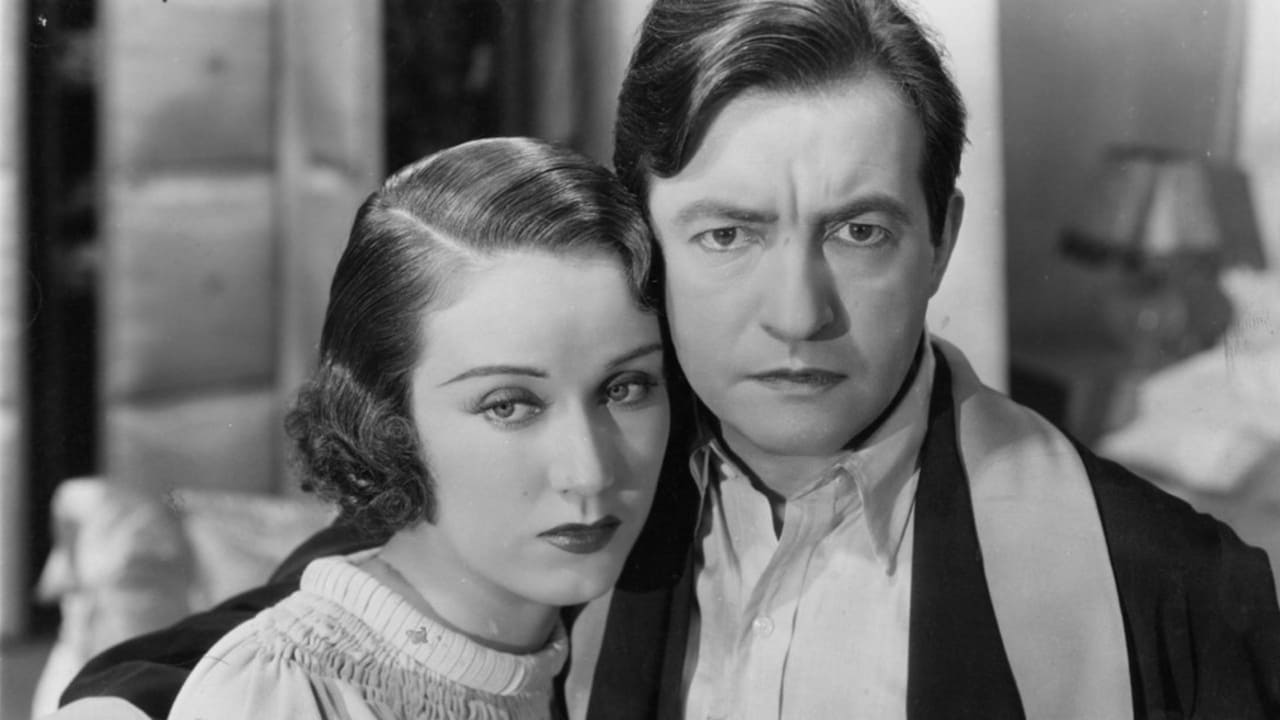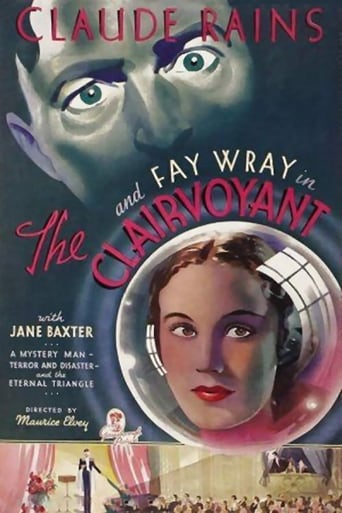

I love old movies. But there's a line -- it varies by film -- where a film just has that old look and feel; I find it often around 1932 or 1933. This film was 1935 and has that old, old, old cinema-look, but it was a British film, and the Brits were a bit behind in the development of cinema. That's not to say it's unwatchable.The other problem here -- often a problem with the more simple scripts of the early 1930s -- is predictability. While the end is not so predictable, various points throughout the film are, and this hardly keeps you on the edge of your seat.Claude Rains was one of my favorite character actors. Here it was actually difficult to like him much. This was his third film, but right after "The Invisible Man". I think a big problem with this film is not only over-acting, but also "over-directing".Claude Rains is fairly good as Maximus, the clairvoyant, although there's a bit of mugging...to reminiscent of silent films. This is the least favorite role I've ever seen him in. Fay Wray, never one of my favorites, is actually quite good here as the wife. Jane Baxter, with whom I am not familiar, was good as the woman who comes between the Maximus and his wife when they realize she is somehow the contact with the spirit world. However, no one stands out here.To me, the only real reason to watch this film would be to see a VERY old style movie. This might be a good film for a remake.
... View MoreFollowing their respective successes in THE INVISIBLE MAN and KING KONG, Claude Rains and Fay Wray teamed up for this minor British effort that bears something of an odd alternative title, THE EVIL MIND. The fact that Rains' character isn't evil kind of negates this moniker, which I guess was invented to tie in with his villainous invisible role the year before. Anyhow, THE CLAIRVOYANT is a decent kind of film, well-shot and spooky throughout, the kind they don't make anymore. Director Maurice Elvey had been working for decades and he handles his light material with aplomb.Rains gives an excellent performance as the titular character who discovers he really can foresee the future when he's in the presence of a newspaper owner's daughter. He foretells disaster, firstly on a train he's travelling in, and later in a big-set piece where miners are drilling below a river when a massive cave-in literally brings the roof down. Who says that the FINAL DESTINATION films are original? This film, especially the bit on the train, proves otherwise and the producers of that modern franchise ought to acknowledge the ideas they borrowed from this flick in their credits.The short running time means we've got a nicely-paced movie that even has an interesting love-triangle sub-plot. Although it doesn't go anywhere, this sub-plot certainly isn't boring. I didn't really care for Jane Baxter in this film, but Fay Wray truly is lovely and puts in a nice turn as Rains' put-upon wife. For a thriller, there's a fair amount of suspense built up along the way, along with some good effects in the frightening cave-in sequence. Things climax with one of those courtroom scenes so beloved of early film-makers, and I was utterly gripped as I waited to see how things would turn out for our hero. I wasn't disappointed; THE CLAIRVOYANT isn't a horror film, but it's a decent little thriller all the same.
... View MoreThis is a VERY unusual movie - because, in contrast to the many other movies with supernatural subjects, that clearly uncover them at some point as charlatanry, with fake séances and other known tricks of the trade, "The Clairvoyant" actually suggests to us that there ARE such supernatural powers! (The only other classic movie of that kind that I can remember is "Night Has a Thousand Eyes".) The funny thing is that, in the beginning, we're being pretty clearly informed that 'the Great Maximus' IS a charlatan, and how he does his tricks at a modest little vaudeville show. BUT as soon as a certain woman turns up in the audience one evening, he clearly changes and suddenly is able to REALLY foresee future events - and his mother from behind the scenes realizes, shivering: "I know what that is; my father had it: it's the gift to SEE..." And actually, he foresees a horrible train accident while they're on their way home - and this strange woman passes him by again... They get off the train; and soon afterward, there's the crash he foretold...Now things change radically in Maximus' life - and in his character, too: he becomes pretty much conceited, and bargains for a big engagement at a famous theater, although his wife and assistant Rene begs him to give the whole thing up... Well, but his gift seems to have disappeared together with the strange woman; and so he gets fired soon. But then the woman comes to visit him, and turns out to be Christine Shawn, the daughter of a very influential businessman - and immediately, his 'gift' returns: spontaneously, he predicts the (VERY unlikely) derby winner; and is once again right, and celebrated by the public.He's introduced to the 'high society' by Christine's father - which makes Rene jealous, and she decides on the spur of the moment to leave him while he's speaking at a banquet. But at the same moment Christine turns up - and now Maximus starts foreseeing REALLY tragic events; with horrible consequences for himself...This movie, whether you find its insisting on supernatural powers crazy or not, is in ANY case worth watching for every fan of classic cinema: first of all, it gives Claude Rains the possibility to show as 'the Great Maximus' ALL nuances of his huge acting talent, from the cocksure swindler to the genuinely frightened man - frightened by himself and his 'powers'. Then there's of course lovely Fay Wray as his wife Rene, who, besides her usual sweetness, is also allowed to show a display of jealousy here - which gradually changes to some strange kind of sympathy with Christine, who 'gives' her husband his inspirations. There are moments of genuine drama, of supreme suspense, of emotions of all kinds, and even of humor to lighten up the atmosphere; anyway, there's not a MOMENT of boredom throughout the whole movie!
... View More1935's "The Clairvoyant" was a Gaumont-British production retitled "The Evil Mind" for US release, starring native son Claude Rains and actress Fay Wray, imported from Hollywood like Boris Karloff in 1933's "The Ghoul." Following on from "The Invisible Man," "The Man Who Reclaimed His Head," and "Mystery of Edwin Drood," Rains plays the title role of The Great Maximus, who has been developing a phony mind reading act with devoted wife Rene (Wray), but whenever in the presence of young Christine Shaw (Jane Baxter) is mysteriously able to foretell actual future events in a trance-like state. Simple predictions such as who will win the Darby earn Maximus top dollar doing his phony routine, but his enjoyment of his newfound fame is soon compromised by the public's demand for prophecies. His loving marriage is strained by his close involvement with Christine, who admits to Rene that she loves him, but the climax comes when the predicted mining disaster is blamed on Maximus himself, his attempt to warn the workers ahead of time labeled a publicity stunt. Among the unbilled faces are Donald Calthrop (soon to appear with Karloff in "The Man Who Changed His Mind"), who convinces Maximus to be true to his wife, and especially Felix Aylmer, memorable presence in such later Hammers as "The Mummy" and "Never Take Sweets from a Stranger," who truly excels as the scene stealing prosecutor tormenting Maximus on the stand. While Rains is excellent, it's really Fay Wray who stands out, turning what could have been a rather thankless role as the neglected wife into a living breathing human being, and a happy ending was had by all.
... View More